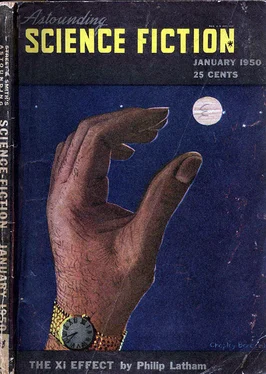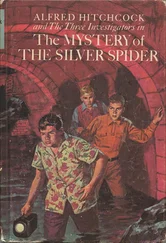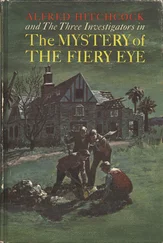Роберт Ричардсон - The Xi Effect
Здесь есть возможность читать онлайн «Роберт Ричардсон - The Xi Effect» весь текст электронной книги совершенно бесплатно (целиком полную версию без сокращений). В некоторых случаях можно слушать аудио, скачать через торрент в формате fb2 и присутствует краткое содержание. Город: New York, Год выпуска: 1950, Издательство: John Wood Campbell, Jr., Жанр: Фантастика и фэнтези, на английском языке. Описание произведения, (предисловие) а так же отзывы посетителей доступны на портале библиотеки ЛибКат.
- Название:The Xi Effect
- Автор:
- Издательство:John Wood Campbell, Jr.
- Жанр:
- Год:1950
- Город:New York
- ISBN:нет данных
- Рейтинг книги:4 / 5. Голосов: 1
-
Избранное:Добавить в избранное
- Отзывы:
-
Ваша оценка:
- 80
- 1
- 2
- 3
- 4
- 5
The Xi Effect: краткое содержание, описание и аннотация
Предлагаем к чтению аннотацию, описание, краткое содержание или предисловие (зависит от того, что написал сам автор книги «The Xi Effect»). Если вы не нашли необходимую информацию о книге — напишите в комментариях, мы постараемся отыскать её.
The Xi Effect — читать онлайн бесплатно полную книгу (весь текст) целиком
Ниже представлен текст книги, разбитый по страницам. Система сохранения места последней прочитанной страницы, позволяет с удобством читать онлайн бесплатно книгу «The Xi Effect», без необходимости каждый раз заново искать на чём Вы остановились. Поставьте закладку, и сможете в любой момент перейти на страницу, на которой закончили чтение.
Интервал:
Закладка:
But the American Ephemeris said otherwise. An occupation of Jupiter I was scheduled for Thursday, October 5th, at four hours eight minutes and ten seconds of Greenwich Civil Time.
Arnold was delighted. “I’ll meet you at the ten-inch at seven-fifteen tonight. O.K.?”
“O.K.”
“We can stop in at my house for a drink afterward.”
“We’ll probably need one,” was Stoddard’s grim comment, “after we find out how much the universe has shrunk.”
The lamp over the desk threw grotesque shadows around the circular room making the telescope and pier look like some giant insect flattened against the curving walls of the dome. At that moment, however, Stoddard was in no mood to appreciate the projective geometry of shadow pictures. Like all other manually operated observatory domes in the world, the one on the ten- inch at Western Tech opened only with the utmost reluctance. At length in response to an effort worthy of superman, Stoddard forced the shutter back revealing the constellation of Cygnus sprawling across the meridian. Breathing heavily, he turned the dome until Jupiter came into the center of the opening, a gleaming yellow stoplight among the faint stars of Aquarius. Then swinging the telescope around on the pier as if it were an antiaircraft gun, he sighted along the tube until the planet came darting into the field of view.
“How’s the seeing?” asked Arnold, a formless black shape by the desk. He twisted the shade over the lamp until the light illuminated the chronometer and pad of paper at his elbow but left the end of the telescope in shadow.
Stoddard gave the focusing screw another touch. “Not so good,” he muttered. Removing the eyepiece from the end of the telescope he substituted a longer one in its place from the box beside him. “There—that’s better.”
“How do the satellites look?”
“Well, just about the way the Ephemeris predicted. Callisto and Ganymede are over on the west. Europa’s about a diameter of Jupiter to the east. Io doesn’t seem to be anywhere around.”
He lowered the seat on the observing platform a couple of notches thus enabling him to look into the telescope with less strain on his vertebrae. “Wait a minute—caught a glimpse of her at the limb just then.”
Arnold shot a glance at the chronometer. “Gosh, don’t tell me it’s going into occultation already!”
“Well, it sure looks like it.”
“But it can’t be that much ahead of time.”
“Why not? That’s what you were hoping for, wasn’t it? Keep an eye on the chronometer, anyhow. I’ll give you the time as close as I can in this bum seeing.”
For several minutes the dome was silent except for the steady ticking of the chronometer and the low hum of traffic from Los Feliz Boulevard far below. Stoddard concentrated his every faculty on the tiny point of light projecting from the planet’s disk. Sometimes he felt sure it must be gone only to have it flash into view again. He waited until it had remained out of sight for an unusually long interval. “All right, get ready,” he warned. “Now!”
“Seven-thirty-three-zero-zero,” said Arnold, writing down the numbers at the top of the record sheet. Stoddard rose painfully from his cramped position at the end of the telescope and began cautiously exercising one leg. His partner continued figuring busily for another five minutes. Presently he leaned back and began tapping the desk thoughtfully with the tip of his pencil.
“What’s the answer?” said Stoddard, limping across the room.
“Well, according to these figures,” Arnold replied, speaking with elaborate casualness, “the occultation occurred just thirty-five minutes and ten seconds ahead of time.”
For a moment neither spoke. Then Stoddard let out a belly laugh that shattered the peaceful calm that had hitherto enveloped Observatory Hill. “That puts Jupiter right in our backyard. It’s so close the light gets here in nothing flat.”
Arnold gazed up at the planet riding so serenely among the stars. There were Vega and Altair over in the west, with Cygnus flying close behind, and the great square of Pegasus wheeling upward in the north, precisely as he had seen them a thousand times before. Could it be possible that some catastrophe from Outside had warped their little corner of space until the giant Jupiter had been brought to what would once have been an arm’s length, so close you might have reached out and seized it between your thumb and forefinger like a cherry? As a boy he had loved to read tales of time travel and flights to other planets, and the feeling that something transcendental was lurking around the corner had never entirely left him. In their seminars they talked of world lines and a space of n dimensions but did any of them really believe it? Now perhaps it was here at last. He shivered in the damp night air. The ocean breeze blowing in through the dome certainly felt real enough.
Mechanically he began helping Stoddard put the telescope to bed for the night, replacing the cap on the objective and swinging the telescope over the polar axis, where he clamped it in declination.
“What do you say we go down in the darkroom for a smoke?” said Stoddard, when everything was shipshape. “I’d like to take a look at those figures of yours myself.”
The darkroom in the basement below was a welcome relief from the windy dome. Stoddard threw off his jacket, pulled a stool up to the bench that ran down one side of the room, and began stoking his pipe from a can of tobacco in one of the drawers. Not until this operation was completed to his entire satisfaction, and the howl glowing brightly, did he turn his attention to Arnold’s reduction. Then with exasperating deliberation he started checking off the figures, pausing occasionally between puffs to compare them with those in the Ephemeris . Arnold leaned against the wall watching him nervously.
“Well, I can’t seem to find anything wrong,” he admitted grudgingly, “but, of course, that doesn’t mean it’s right, either.”
Taking careful aim, he blew a smoke ring at the girl on the calendar over the sink, watching it swirl around her plunging neckline with moody satisfaction. “A dozen times in my life I’ve got results almost as crazy as this one. Every time I couldn’t help saying to myself, ‘Stoddard, maybe you’ve discovered something at last. Maybe you’ve stumbled onto something big.’ So far I’ve never made a single scientific discovery.
“Now you take this observation tonight. Sure, it would be exciting to suppose the solar system has shrunk to the size of a dime, but first I want to be absolutely sure there isn’t some perfectly natural commonplace explanation. It’s a depressing fact that most of the exciting results a scientist gets can eventually be traced to errors of observation. Think of all the times Mira Ceti at maximum has been mistaken for a nova.”
“Everybody knows that,” Arnold objected. “But where’s the chance for error in this observation? It’s so simple.”
“Maybe not so simple as you think. Remember the seeing was terrible. That time I gave you might have been off by a couple of minutes—maybe more.”
“That still leaves thirty minutes to explain.”
“All right. Now the question is how much faith can we put in the Ephemeris ? It wouldn’t surprise me if the predicted time itself was way off.”
“As much as that?”
“Well, I know the predictions for Jupiter’s four great satellites are based on Sampson’s tables.of 1910, and they certainly must require some kind of correction by this time. I don’t know how often the Naval Observatory checks up on things like that. But until we do know—and have a lot more observations—we really don’t know a thing.”
Читать дальшеИнтервал:
Закладка:
Похожие книги на «The Xi Effect»
Представляем Вашему вниманию похожие книги на «The Xi Effect» списком для выбора. Мы отобрали схожую по названию и смыслу литературу в надежде предоставить читателям больше вариантов отыскать новые, интересные, ещё непрочитанные произведения.
Обсуждение, отзывы о книге «The Xi Effect» и просто собственные мнения читателей. Оставьте ваши комментарии, напишите, что Вы думаете о произведении, его смысле или главных героях. Укажите что конкретно понравилось, а что нет, и почему Вы так считаете.












